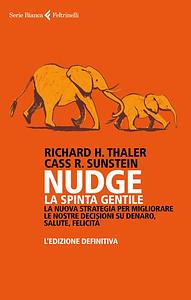Take a photo of a barcode or cover
Very interesting look at how we make choices, and how choices can be influenced.
The concept of "choice architecture" is a good and solid one, but I think time just hasn't been kind to this book. There are so many other books published in the last few years that delve into similar concepts but do it in a more engaging way.
While waiting for for my hold on Thaler's latest book to become available, I read this one. While I was already very familiar with the vast majority of its concepts from other books, courses, articles and other resources, it held good reminders and reinforcements around the ideas of opting-in versus opting-out, inertia, framing, and other decision-making guides (and biases). Written in layman's terms, this book holds broad appeal with excellent examples of "nudge" applications to both business and various societal issues. It may make you stop and think regarding your own decision making and incentives, and it may also influence how you choose to approach engaging with others in order to help them, and associated organizations, move forward.
Explains “choice architecture” (nudging people to do the right thing, like contribute to their 401k, donate their organs after death or conserve energy), using what the authors call “libertarian paternalism.” Which sounds kind of awful, but it’s not, really. This book took me forever to read.
Libertarian paternalism: Interesting thoughts on how to get people to do what's best for them or do the "right thing" without sacrificing their freedom of choice, by "nudging" people's "automatic system" of their brain.
Nutrition, spending, retirement saving, charitable giving, Medicare drug plans, urinals...
The second half of the book addresses ways to engage your own "reflective system" to nudge the "automatic system" in order to make positive changes in your habits.
The last few chapters also seem to stretch the concept of the book a little beyond where it should have went.
Nutrition, spending, retirement saving, charitable giving, Medicare drug plans, urinals...
The second half of the book addresses ways to engage your own "reflective system" to nudge the "automatic system" in order to make positive changes in your habits.
The last few chapters also seem to stretch the concept of the book a little beyond where it should have went.
Subtitle was misleading. Not much here on using nudges in your personal life to influence behavior. Very dry and bland book.
Audio
Audio
It would be unfair to label Nudge as 'one of those pop-psychology books' as a. I frown on pop psychology and rate Nudge higher, and b. I'm trying not to generalise.
What I'm trying to say is Nudge fits into the same category as other insightful books such as Gladwell's Blink, or the recent Redirect
[[ASIN:0316010669 Blink: The Power of Thinking Without Thinking]]
[[ASIN:0316051888 Redirect: The Surprising New Science of Psychological Change]]
Beginning with a non-partisan disclaimer Nudge explores the concept of choice architecture: essentially controlling the environment in which people make choices to encourage well-being without directly controlling peoples choice.
Like most insightful type books, Nudge occasionally errs from actually discussing Nudge's and becoming the author's expression of 'how things should be in the world' but is an enjoyable and balanced read nonetheless.
Highlights include The author's discussion of the affects of medical liability insurance, and the privatisation of marriage, but issues from environmentalism and eating peanuts at a party are also included.
Much recommended for anyone wanting to think about politics and interventions a little differently.
What I'm trying to say is Nudge fits into the same category as other insightful books such as Gladwell's Blink, or the recent Redirect
[[ASIN:0316010669 Blink: The Power of Thinking Without Thinking]]
[[ASIN:0316051888 Redirect: The Surprising New Science of Psychological Change]]
Beginning with a non-partisan disclaimer Nudge explores the concept of choice architecture: essentially controlling the environment in which people make choices to encourage well-being without directly controlling peoples choice.
Like most insightful type books, Nudge occasionally errs from actually discussing Nudge's and becoming the author's expression of 'how things should be in the world' but is an enjoyable and balanced read nonetheless.
Highlights include The author's discussion of the affects of medical liability insurance, and the privatisation of marriage, but issues from environmentalism and eating peanuts at a party are also included.
Much recommended for anyone wanting to think about politics and interventions a little differently.
Informative read about the gentle nudge. Especially entertaining when Thaler and Sunstein poke fun at each other.
You know, I always knew there was a concept like "choice architecture*" but I could never name it. This book really helped give me a vocabulary for lots of the things that we *don't* do (but could be doing, and doing better) in libraries. We are in the public service business, and for so long we have focused on the concept of abundant information choice rather than helping patrons close off the irrelevant information choices that hamper their knowledge-gathering. I think I am going to have to sit on these ideas for a while and let them percolate...
*choice architecture is the way in which you present choices to people and how that presentation affects their eventual decisions. This can be used for good and evil, of course, and the authors say they subscribe to libertarian paternalism which means they believe in trying to gently steer folks towards the decisions they might have made themselves with enough time & resources to consider everything fully. I guess I am wary of this concept because it has the potential to be abused, and easily so. At any rate, I expect I will keep considering these ideas for some time to come!
*choice architecture is the way in which you present choices to people and how that presentation affects their eventual decisions. This can be used for good and evil, of course, and the authors say they subscribe to libertarian paternalism which means they believe in trying to gently steer folks towards the decisions they might have made themselves with enough time & resources to consider everything fully. I guess I am wary of this concept because it has the potential to be abused, and easily so. At any rate, I expect I will keep considering these ideas for some time to come!



